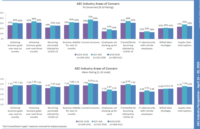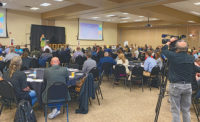With all but seven states having enacted stay-at-home orders in response to the COVID-19 pandemic and a growing number of cities shutting down non-essential construction, anxiety about impacts to the industry—both from a business and economic perspective as well as health and safety—continues to rise from week to week, according to results of the second in a series of surveys conducted by Clear Seas Research and BNP Media, the parent company of ENR.
Concerns about business stability and the economy jumped between the first survey, conducted March 24-26, and the second, with data gathered April 2-6. In the new survey, 75% of respondents were concerned about the state of the economy—up from 59% in the first survey—and 65% were concerned about business stability over the next twelve months, up from 54%.
More than half of respondents worry about supply chain interruptions, while just under a third are concerned about cybersecurity due to employees working remotely.
Personal safety was also on the minds of respondents, with more than half now worried that they would personally become infected, up from 44% in the previous survey, and 69% fearing friends, family or colleagues would fall ill, up from 61% previously.
"In our company, three people have already died from COVID-19," said one survey respondent.
[For ENR’s latest coverage of the impacts of the COVID-19 pandemic, click here]
COVID-19 is affecting schedules for active and planned projects. Just over half of active projects remain on schedule across all firms on average, with 35% percent delayed and 14% cancelled. Planned projects follow on similar lines, with less than half of planned projects on schedule, 39% delayed and 12% cancelled. More than two thirds of respondents saw a decline in business development activity, while 61% have curtailed investment in equipment, tech or services.
"As a self-employed designer-architect, I have never seen things this bad as they are right now," said one respondent. "Even in 2008, clients were still into planning projects. I am totally dead in the water and working on ongoing projects with only one new active client over the last two months. Most clients have stopped projects all together for obvious reasons."
Response to staffing plans revealed that 62% of respondents say their firm plans to either lay off or temporarily suspend some employees in the next three months. Broken out, that includes 24% who anticipate layoffs, 22% who anticipate temporarily suspending employees with pay and 16% who anticipate temporarily suspending employees without pay.
Nearly two thirds of respondents said their organization has been classified as an "essential business" by their state or municipality.
Thirty percent of respondents said their firm would be applying for the Small Business Stimulus Loan through the Coronavirus Aid, Relief and Economic Security, or CARES, Act. A further 21% indicated no current plans to apply, even though their firms qualified.
Asked what steps their firm was taking to boost employee health and welfare and mitigate virus transmission, 71% said their company has eliminated face-to-face meetings, and nearly half are allowing employees to work from home. On the flip side, one survey respondent located near Sacramento, Calif., said that their firm was still requiring employees to come into the office and wouldn't let work stations be transferred to home offices.
Almost one fifth (19%) said their firm had temporary shut down entirely.
One respondent asked, "How will we ever recover?"
The first survey analyzed responses from 292 participants spread across the country. The second garnered 360 responses. Respondents came from firms ranging in size from more than 10,000 to fewer than 10; those from smaller firms participated in greater numbers, with 56% in the second survey coming from firms with 50 or fewer employees.
The survey can be downloaded for free here.







Post a comment to this article
Report Abusive Comment